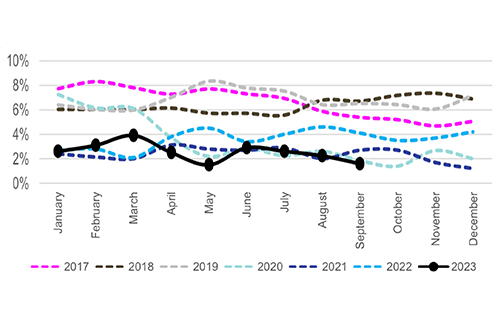Appraising the new regulation, Leonie Dunn, deputy governor of the Bank of Namibia, emphasised significant advantages it offers to property owners and prospective property buyers: “These regulations mirror recent economic conditions which require a further relaxation while safeguarding financial stability. They are designed to foster investment in the property sector, generate job opportunities, and make a positive contribution to economic growth and recovery.”
Dunn expressed these sentiments after loan-to-value ratios for purchasing multiple homes through mortgage bonds to mitigate financial risks were relaxed through a new regulation issued by the finance and public enterprises ministry on the recommendation of the Bank of Namibia. The new regulations became effective on 31 October 2023.
The latest regulations replaced the previously issued Regulations on Restrictions on Loan-to-Value (LTV) Ratios in 2019. Simply put, the Loan-to-Value Ratio represents the amount of money lent to a borrower by a banking institution to purchase a property in relation to the property’s price or valuation, and the deposit required from the borrower.
The new regulation provides for a further relaxation of LTV ratios, particularly concerning additional property purchases. As such, a mortgage loan for a second residential property no longer requires any deposit, while mortgage loans for third and subsequent residential properties only require a 10% deposit. 4. Recent economic conditions and shifts in the Namibian property market prompted these changes. Banking institutions are mandated to establish comprehensive policies and procedures to ensure adherence to the loan-to-value restrictions outlined in the regulations.
The central bank earlier this year reviewed how much of a deposit individuals can put up when they are buying an additional property. At the time, BoN governor Johannes !Gawaxab said the bank was considering counter cyclical limits to these ratios.
During a monetary policy announcement early in 2023, !Gawaxab said there was growing concern of the low credit uptake by businesses.
The governor to a larger extent blamed Covid-19 on the low uptake, saying the pandemic had weakened many entities’ balance sheets, to the extent that they were unable to qualify for necessary financing, and in some cases businesses have even closed shop.
“This is evidenced in the year-on-year growth in private sector credit extension (PSCE), which declined to 3,1% in February compared to 4,1% in December 2022. The slowdown in PSCE growth emanated from lower demand for credit by the business sector, partly due to the lingering effects of the Covid-19 pandemic,” he said.
The Namibian banking sector is largely concentrated in the property market, which makes up over 50% of loans and advances of the banking sector.
By introducing countercyclical limits, the central bank observes the property market and adjusts loan to value (LTV) ratios to mirror the market’s performance. When there is a boom for example, countercyclical management of LTVs would reduce LTV ratios, not increase them, as the price of houses escalates. Correspondingly, down payments should be increased, not reduced. The opposite should also happen when appetite for housing decreases.
Notes on such limits suggest that such LTV limits should be transparent, easy to apply and relatively free from political interference.
In 2019, then governor Iipumbu Shiimi, through the stamp of the finance ministry, relaxed the LTV ratios.
The finance ministry, through the BoN, implemented LTVs as a way of preventing financial institutions from taking risks that could threaten the financial system.
The decision to review the current LTV policy was supported by the slowdown in the local economy, and a significant correction in the housing market.
“At these adjusted levels, the bank believes that the LTV ratio will continue to shield the financial system from undue risk,” said Shiimi at the time.
The total mortgage loans of the banking sector as of 2022 stood at N$57 billion.w



